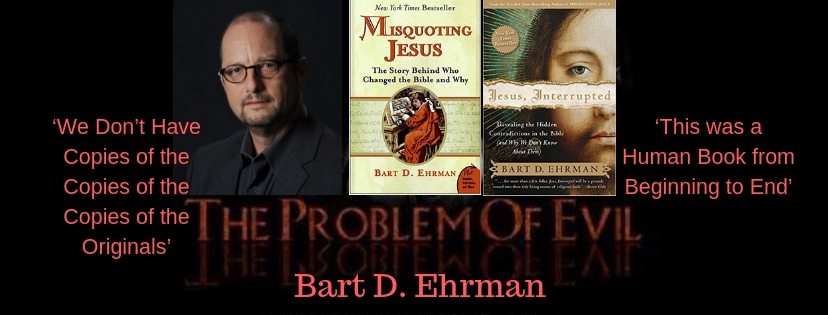
By EDWARD D. ANDREWS
A professor of religious studies in North Carolina, U.S.A., who is a world-renowned Agnostic New Testament textual scholar, describes the Bible in this way: “It is a radical shift from reading the Bible as an inerrant blueprint for our faith, life, and future to seeing it as a very human book, with very human points of view, many of which differ from one another and none of which provides the inerrant guide to how we should live. This is the shift in my own thinking that I ended up making, and to which I am now fully committed. Many Christians, of course, have never held this literalistic view of the Bible in the first place, and for them, such a view might seem completely one-sided an unnuanced (not to mention bizarre and unrelated to matters of faith). There are, however, plenty of people around, who still see the Bible this way. Occasionally, I see a bumper sticker that reads: ‘God said it, I believe it, and that settles it.’ My response is always, What if God didn’t say it? What if the book you take as giving you God’s words instead contains human words? What if the Bible doesn’t give a foolproof answer to the questions of the modern age—abortions, women’s rights, gay rights, religious supremacy, Western-style democracy, and the like? What if we have to figure out how to live and what to believe on our own, without setting up the Bible as the false idol—or an oracle that gives us a direct line of communication with the Almighty? There are clear reasons for thinking that, in fact, the Bible is not this kind of inerrant guide to our lives: among other things, as I.ve been pointing out, in many places as we (as scholars, or just regular readers) don’t even know what the original words of the Bible were. (bold mine)—Bart D. Ehrman, The Story Behind Who Changed The New Testament and Why (New York, NY: Continuum, 2008), p. 13-14.
If we were to start with the presupposition of reading the Bible as “a very human book,” then we would be lean toward discarding and direction or principles that do not satisfy our own personal taste. How is this Agnostic evangelist for “a very human” book described by today’s scholarly world?
Biography
Bart D. Ehrman is one of the most renowned and controversial Bible scholars in the world today. He is the James A. Gray Distinguished Professor of Religious Studies at the University of North Carolina, Chapel Hill, and is the author of more than twenty books, including the New York Times bestsellers How Jesus Became God; Misquoting Jesus; God’s Problem; Jesus, Interrupted; and Forged. He has appeared on Dateline NBC, The Daily Show with Jon Stewart, CNN, History, and top NPR programs, as well as been featured in TIME, the New York Times, The Washington Post, The New Yorker, and other publications. He lives in Durham, North Carolina.—HarperCollins Publishers.
A Facebook person interested in New Testament Textual Criticism (NTTC) writes, “I was very reluctant [to buy Ehrman books] as I have tended to regard Ehrman as an anti-church type.” We ask, ‘That wouldn’t be because he is an atheist in agnostic clothing, would it?’ Or, ‘it wouldn’t be the fact that he has stumbled many Christians with his books?’
This Facebook commenter in a New Testament Textual Criticism group went on to say, “If you are theologically conservative or tend toward fundamentalism or are deeply connected to a traditional church-based understanding of the NT, then you might want to avoid it. I am a Christian but have been reading the Bible critically for a long time and am not connected to one tradition in this regard. If you have a similar attitude, you might want to take a look at this book. It is great. I am about sixty percent through. Ehrman is quite even-handed and his comments are very helpful.”
What is amazing is this, Joel Osteen is seen as a fraud, a false prophet, false teacher because he twists the truth and God’s word for his prosperity ministry. However, it seems that textual scholars and Bible translators give Bart D. Ehrman a pass on doing the very same thing. Will someone please tell me what the Greek word apostasia means? Please tell me how it is used in the New Testament?
Apostasia: This is rejecting, defecting, revolting, abandoning or deserting the worship and service of God, and actually rebelling against the faith and God they formerly worshipped and served.
Apostates will arise within the Christian congregation, right?
1 Timothy 4:1 Updated American Standard Version (UASV)
4But the Spirit explicitly says that in later times some will fall away from the faith, paying attention to deceitful spirits and doctrines of demons,
2 Thessalonians 2;3 Updated American Standard Version (UASV)
3 Let no one deceive[5] you in any way, for it will not come unless the apostasy[6] comes first, and the man of lawlessness is revealed, the son of destruction,
Don’t apostates seek to have their own followers, causing division, and stumbling genuine Christians?
Acts 20:28-30 Updated American Standard Version (UASV)
28 Pay careful attention to yourselves and to all the flock, in which the Holy Spirit has made you overseers, to care for the congregation[1] of God, which he obtained with the blood of his own Son.[2] 29 I know that after my departure fierce wolves will come in among you, not sparing the flock; 30 and from among your own selves men will arise, speaking twisted things, to draw away the disciples after them.
[1] Gr ekklesia (“assembly;” “congregation, i.e., of Christians”)
[2] Lit with the blood of his Own.
2 Peter 2:1, 3 Updated American Standard Version (UASV)
2But false prophets also arose among the people, just as there will also be false teachers among you, who will secretly introduce destructive heresies, even denying the Master who bought them, bringing swift destruction upon themselves. 3 and in their greed they will exploit you with false words; their judgment from long ago is not idle, and their destruction is not asleep.
Is it not true that apostates abandon the faith but then they also speak abusively of the faith, “upsetting the faith of some.”
2 Timothy 2:16-18 Updated American Standard Version (UASV)
16 But avoid empty speeches that violate what is holy, for they will lead to more and more ungodliness, 17 and their word will spread like gangrene; Hymenaeus and Philetus are among them. 18 men who have gone astray from the truth saying that the resurrection has already taken place, and they upset the faith of some.
Do apostates oppose the faithful followers of Christ?
John 15:20-21 Updated American Standard Version (UASV)
20 Remember the word that I said to you: ‘A slave[65] is not greater than his master.’ If they persecuted me, they will also persecute you. If they kept my word, they will keep yours also. 21 But all these things they will do to you on account of my name, because they do not know the one who sent me.
How does the Bible say that faithful Christians are to treat apostates?
2 John 9-10 Updated American Standard Version (UASV)
9 Everyone who goes on ahead and does not remain in the teaching of Christ, does not have God; the one who remains in the teaching, he has both the Father and the Son. 10 If anyone comes to you and does not bring this teaching, do not receive him into your house or give him any greeting;
Romans 16:7-8 Updated American Standard Version (UASV)
7 Greet Andronicus and Junias, my kinsmen and my fellow prisoners, who are outstanding among the apostles, who also were in Christ before me. 8 Greet Ampliatus, my beloved in the Lord. 9 Greet Urbanus, our fellow worker in Christ, and Stachys my beloved.
Now, if you will tell me please what does the Greek word antichristos mean? How is it used in the New Testament? How many antichrists are there according to the apostle John?
Antichristos: this means to be against or instead of Christ. The term applies to all who reject and oppose what the Bible says about Jesus Christ. These ones also mistreat his followers. Trying to mislead, misrepresent, and misinform about the Word is also the work of the antichrist.
1 John 2:18 Updated American Standard Version (UASV)
18 Little children, it is the last hour; and just as you heard that antichrist[4] is coming, even now many antichrists have arisen; whereby we know that it is the last hour.
Do the antichrists not abandon the faith that they once loved?
1 John 2:19 Updated American Standard Version (UASV)
19 They went out from us, but they were not of us; for if they had been of us, they would have continued with us; but they went out, so that they would be revealed that they all are not of us.
Do the antichrists deny Jesus Christ?
1 John 2:22 Updated American Standard Version (UASV)
22 Who is the liar but the one who denies that Jesus is the Christ? This is the antichrist, even the one who denies the Father and the Son.
SO, how are faithful Christians to treat the apostates and the antichrists?
Many so-called faith Bible scholars have co-authored books with Bart D. Ehrman, who has now spent decades penning books and articles that misleadingly try to undermine the Word of God. This has given Ehrman a platform to spew his misinformation. If Satan could come down as s human and he was the best damn textual scholar you ever saw, would anyone write a book with him, praise his books, give him a platform to spew his lies. It has taken a truckload of textual scholars to deal with the deception of Ehrman.
Just because Ehrman is hiding in the guise of a Bible scholar and his words are like a glass of water that is half poison, half water, the scholarly world has forgotten or ignores who he really is. See the truth.
Many unsuspecting Christians have no clue about Ehrman. It wasn’t people calling him an apostate that impacted him in any way. As that was not the case with him. What caused him to leave Christianity was his own doubts about God’s Word. LISTEN VERY CAREFULLY so you can get the correlation. He LEFT CHRISTIANITY because of HIS OWN DOUBTS about the truthfulness and trustworthiness of the Bible.
He went to the most conservative Bible college in the United States, Moody. Then, he went to one of the best colleges after his two-year degree, Wheaton College. This was followed by Princeton Theological Seminary. His doubts about the Bible started at Wheaton. He did not address those doubts, he kept them bottled up. Then, at Princeton they were flooding into him so much, it was pushing his faith out. Then, he wrote a paper on an apologetic problem in the Gospel of Mark. His professor returned his paper with a little note at the bottom – “Maybe Mark was just wrong.”
This was the straw that broke the proverbial camel’s back. Ehrman concluded that if Mark was wrong there, he can be wrong in other places and the other authors can be wrong too. This opened up Pandora’s Box. He was not a Moody Bible College now, he was a Princeton with MANY liberal professors that continued to feed his doubt.
EDUCATION: Moody Bible Institute (1973-1976), Wheaton College (B.A., 1978), Princeton Theological Seminary (M.Div., 1981; Ph.D., 1985)
His thirty books have included at least 20 that have been written so as to undermine the Greek New Testament as NOT the Word of God but as the Word of man. He has spent 20+ years doing exactly what was done to him, causing Christians to doubt the word of God and to doubt Jesus Christ. He just does not say these things aloud or on social media, because he is ignorant of things, he is the New Testament professor at Chapel Hill in NC. He is a New York Times Bestselling author. He debates Christians publicly with his message in the most mocking attitude. He has a worldwide ministry geared against Jesus Christ and the Word of God and you think I am being too hard on him.
This article does not label him an apostate antichrist because it is name calling. It does so in order to wake of the unsuspecting Christians that have faith in God’s Word to be cautious as to who they are reading, so they do not become a victim, just as Ehrman did. This article is not telling Christians to not read Ehrman’s books but rather read the other books that tell the whole truth as well.
We need to make up our mind that we will find the solution if we can by any amount of study and research that we have to carry out. We need not abandon the Faith like Bart D. Ehrman because some answers are not readily available. We need to ponder over it and work over it for our entire lives if necessary. Maybe the evidence comes to light for the next generation. Sometimes, the work benefits us much more than when we discover the solution. The solution is there to be found and it isn’t always what we may want it to be, we just have to be willing to buy out the time, to work hard enough and long enough.
EDWARD D. ANDREWS (AS in Criminal Justice, BS in Religion, MA in Biblical Studies, and MDiv in Theology) is CEO and President of Christian Publishing House. He has authored ninety-two books. Andrews is the Chief Translator of the Updated American Standard Version (UASV).













